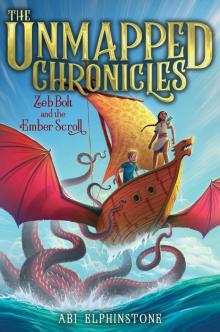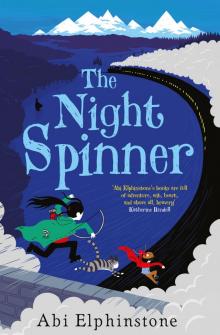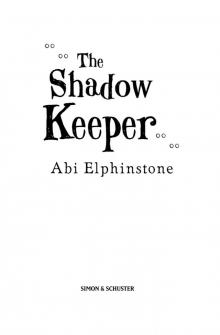- Home
- Abi Elphinstone
Casper Tock and the Everdark Wings Page 2
Casper Tock and the Everdark Wings Read online
Page 2
Candida twisted her long blond hair around her finger. “You weren’t the only one skiving geography, Casper.”
“Yeah.” Leopold sniggered, before stating something that was now blindingly obvious: “We skived too.”
Casper eyed the oak door leading up to his flat at the far end of the library. If he made a dash for it now, he might just make it. But Candida had other ideas.
“Going somewhere?” she sneered, and then she closed five perfectly manicured nails around Casper’s arm. “Because I was so looking forward to spending time with you this weekend now the holidays have been delayed.”
“H-home,” Casper stammered. “Just home.”
Candida frowned. “But that turret’s not really home now, is it, Casper?”
Leopold smirked and his double chin spread out like a greasy balloon.
“You don’t belong here,” Candida spat, plucking at Casper’s secondhand blazer, then turning her lip up at his charity-shop rucksack. “The pupils at Little Wallops are from well-connected families. We’re refined. Special. Rich.” She paused, and her next sentence dripped out like oil. “We have class.”
“Yeah. Class.” Leopold only knew about forty-five words, so more often than not he just repeated Candida’s.
Casper thought of his mother, adopted into an English family from a Tanzanian orphanage, and his father, brought up on one of the roughest council estates in London. Together they had made their way in the world. Ariella was a PE teacher at Little Wallops and she also ran lunchtime yoga clubs (frequently attended by pupils who had geography with Mr. Barge) and Ernie taught design and technology (he could carve stools, build tables, make lamps, and fix almost anything that came his way).
But none of that mattered to Candida and Leopold. For them, growing up on an estate didn’t mean high-rise flats and graffiti walls; it meant peacocks, walled gardens, and butlers called Cuthbert. And though Casper rarely yearned for friends, in situations like this he did. Badly. Because there was a tiny and very private corner of Casper’s heart that was bruised and lonely.
“Trouble is, Casper, you don’t fit in here. You’re not the right color or class.”
Casper felt his muscles stiffen at the unfairness of it all, but as Candida tightened her grip on his arm, he knew he didn’t have the guts to stand up to her. Candida and Leopold were unpleasant to most people in Little Wallops, because nasty people just can’t help themselves, but they were particularly dreadful to Casper because everything about him was different from them—and they didn’t like it one bit. Candida narrowed her eyes at Casper’s tight black curls and dark skin. “What do we do with misfits, Leopold?”
Leopold looked blank. It was the end of the day and he was running dangerously low on words. “Trash,” he said after a while.
Casper glanced at the trash can in the corner of the room. It would hurt being dunked headfirst into it, but perhaps it wouldn’t be as bad as when Leopold had sat on him during break, causing Casper to lose the feeling in his legs for a week, or the time Candida had burned his English homework and Casper had been put in detention on his birthday for failing to hand it in. But today, fate was on his side.
“Candida and Leopold!” came an old woman’s voice from the doorway.
Casper looked up to see Mrs. Whereabouts walking into the room. She was a strange-looking librarian—she had spiky gray hair, a nose ring, and she always wore a turtleneck, even in the height of summer—but stranger than all of that was her accent. It was impossible to place it, and when anyone asked Mrs. Whereabouts where she was from, she simply waved her hand and said: “Here and there.” But Casper had noticed that she often turned up at just the right time, and now was no exception.
“I hear from Mr. Barge that neither of you attended his lesson this afternoon,” she said as she drew close to the group.
Candida dropped Casper’s arm, then slowly, disdainfully, she turned to face Mrs. Whereabouts. The librarian didn’t seem to belong to an obvious class, so to be safe Candida treated her the same way she treated most of her teachers—with a casual indifference—but she was careful not to overstep the mark because more time in detention meant there was less time to be horrid to other people.
“I was seeing the nurse.” Candida gave a half-hearted cough, and Mrs. Whereabouts raised a silver eyebrow.
“Casper, I hear, was in a piano lesson,” Mrs. Whereabouts continued, and Casper winced at the lie he had fed Mr. Barge. “But you, Leopold?”
Leopold picked up a book from the shelf next to him. “I was”—he paused—“reading.”
Mrs. Whereabouts blinked. “Oh, really? About what?”
Leopold looked at the thesaurus he was holding and made a wild guess. “Theesysauruses. They’re a type of dinosaur.”
Candida rolled her eyes, then Mrs. Whereabouts lifted the book from Leopold’s hands and, very calmly, delivered a detention. “Please report to the headmaster’s office immediately. Tell him that you have no idea what a thesaurus is but you would very much like to copy out every single word inside one.”
Then Leopold did what he always did when words finally failed him: He reached into his pocket. “Couldn’t we just settle this with a nice crisp fiver?”
Mrs. Whereabouts was about to reply when there was a bellow from the doorway.
“DID THE MIGHTY SHANE HOGARTH THROW MONEY AT THE ROARING ROVERS WHEN HE WANTED TO SCORE A TRY?” Mr. Barge exploded as he marched toward Leopold.
Casper still hadn’t a clue who the mighty Shane Hogarth was (no matter how many times Mr. Barge mentioned him), but right now he loved him. Because suddenly, unexpectedly, there was a chance to run. And run Casper did. He tore down the length of the library—unaware that Candida was watching him like a hawk—and flung open the turret door. Then he closed it firmly behind him and for a moment or two he just stood there, panting into the quiet. With a sigh of relief, he climbed the cold stone steps to his flat.
The turret Casper’s family lived in only had four rooms: a sitting room—with a sagging sofa, a threadbare rug, a broken grandfather clock his dad had promised the headmaster he’d fix, and a television that was far too old and small to be considered cool—a poky kitchen and two tiny bedrooms. There was another turret next door, which belonged to Mrs. Whereabouts and her cat, but Casper had only been over there once to borrow milk when they first moved in.
Casper placed his school bag neatly by the door before taking off his shoes and tucking them, at right angles, beneath the sofa. Then he pressed LISTEN on the answer machine. It was a message from his mum saying that she had forgotten her handbag in the village shop—again—but he mustn’t worry because she would be home in half an hour. Casper looked out of the window and bit his lip. It was a drizzly afternoon, and the leaves on the trees left upright after the storms were still, but Casper knew that the sirens could sound unexpectedly on windless afternoons because, many miles away, the weather service had picked up the stirrings of yet another storm.
After the first hurricane hit the country at the beginning of the month, the headmaster had done a headcount in the hall and when he had confirmed that everyone was safe, a ripple of excitement had spread through the school. Pupils had whispered about lessons being canceled and term ending three weeks early while the groundsmen rebuilt the stonework and cleared away the fallen trees. But then the hurricanes had kept coming, roads had closed, train lines had been ripped apart, and the reports of fatalities had started. That was when the headmaster had told every year group that they must remain on school grounds at all times for their own safety. Teachers were allowed to leave if they wished, and it was possible to get to the local village, if you were prepared to clamber over toppled trees and edge past ruined buildings, but otherwise everyone was stuck where they were for the foreseeable future while the weather continued to behave in such an unpredictable manner.
Casper hated that his parents often volunteered to go to the village to stock up on what few supplies had made their way to the shop. What if the
re was another hurricane when his mum was walking home today? Casper tried not to think about it and instead consulted his timetable, then his watch. His dad was late back too. He had probably lost the keys to lock up his design and technology workshop—again—or was helping the groundsmen dig the underground bunker.
Casper decided he would allow himself a glass of juice to steady his nerves before embarking on a new to-do list—an activity that provided him with a satisfying sense of calm and control. But as he was crossing the sitting room, he heard the unmistakable creak of an old door opening. Casper tensed. His mum wasn’t due back for another half hour, it couldn’t be his dad—he always whistled his way up the stairs—and it was hardly likely to be another teacher because they knocked before coming up. But this person had entered quietly, sneakily, as if they didn’t want anyone else to know they were there.
Casper swallowed.
For the first time in the six years he had been living at Little Wallops Boarding School, somebody had followed him into the turret.
Chapter 2
Casper stayed very still for several seconds. Perhaps whoever it was had made a mistake and would just clear off. But there were footsteps now, and they were climbing the stairs.
“Urgh. Even the staircase stinks of his mother’s weird cooking.”
Casper flinched. It was Candida; clearly she hadn’t finished with him yet.
“Why does she insist on cooking African food?” she tutted. “Doesn’t she know that over here we eat cucumber sandwiches and custard creams?”
Casper wished that he was brave enough to stand up for his mum, but he was too frightened, so he made a mental list of his hiding options instead.
Kitchen cupboard: not big enough.
Under his bed: too obvious.
Beneath his parents’ bed: too messy.
Behind the sofa: really?
And then his eyes rested on the grandfather clock in the corner of the room. Casper had seen his dad open it up the night before—there was something wrong with the pendulum and both clock hands were stuck at twelve, he’d said—but a dodgy pendulum was the least of Casper’s problems. He charged toward the clock, yanking the door open using the key slotted into the lock, then he snatched the key out and bundled himself inside.
It was dark within and it smelled of dust and secrets.
“Casper?”
Casper held his breath.
“I know you’re in this poky little turret,” Candida cooed as she tiptoed over the carpet. “And I know for a fact that your parents aren’t. I saw your mother walking down the drive earlier and the lights are still on in your father’s workshop.” She paused. “And there I was assuming your door was always locked…”
Casper’s heart beat in double time as he listened to Candida stalking through the flat. Cupboard doors opened and snapped shut in the kitchen, then Casper watched, through the narrowest crack in the clock door, as Candida returned to the sitting room and dug her nails into the back of the sofa.
“You think I’d let you get away with dumping Leopold in detention?” she hissed. “Do you have any idea how wealthy his family is? His father’s so rich he can make people disappear with just one telephone call.” She lowered her voice. “Your parents would never find you; you’d just wake up one day in Greenland or somewhere equally ghastly and that would jolly well be that.”
Casper grimaced at the thought of such a drastic change to his timetable and tried to ignore the pendulum digging into his shoulder. Then his eyes widened. Candida was right outside the clock now. She looked it up and down, as if regarding a pile of dirty laundry, and Casper didn’t dare blink. Then she flounced from the sitting room into Casper’s bedroom.
Such was the way that Candida moved—dramatically, impatiently, like a spoiled little monarch—that in her wake a small gust of air slipped through the crack in the grandfather clock. The dust around Casper shifted and seemed to glitter in the half-light and it was then, in that hushed moment, that the Extremely Unpredictable Event occurred.
The key Casper was holding now looked altogether different. Without the layer of dust covering it, he could see that it was not simply a dull lump of metal anymore. It was silver and in its base there was a turquoise gem, which was glowing. And it was because of this glow that Casper saw he was not alone inside the clock.
There, sitting opposite him, was a girl holding a small white envelope, out of which she was pulling a note. The girl looked up and, upon seeing Casper, jumped before hastily shoving the note into her pocket and glaring at him.
Casper blinked. Then he blinked again and rubbed his eyes. But the girl was very much still there and she was unlike anyone he had ever seen before. She had tiny gold stars scattered over her cheekbones; she was wearing overalls with several wrenches and screwdrivers poking out of the front pocket; and, most disconcerting of all, she smelled strongly of the Outdoors, a place Casper tried to avoid at all costs because of the wide-open spaces and the lack of lost and found baskets, which made hiding from particular classmates very tricky.
The girl cracked her knuckles and Casper flinched. Was she a burglar? Or an accomplice of Candida’s? But what kind of burglar or accomplice dressed like this? And had she crept inside the turret after lessons or had she been sneaking around up here all day?! Casper tried to gather his thoughts. The clock isn’t big enough for two people to hide in and the girl was definitely not here when I climbed inside because I would’ve sensed her or bumped into her, despite the dark. Wouldn’t I?
But as Casper stared ahead in disbelief, he couldn’t help feeling that the inside of the clock looked somehow bigger now. Roomier. More like a cupboard, perhaps, or an old closet.
The girl narrowed her eyes, like a cat might do before pouncing, and Casper shrank inside his blazer. Was it safer in the clock with this odd girl or outside in the flat with Candida? He couldn’t decide. So he did what most people in England do when they find themselves in an awkward situation: nothing.
It was the girl who spoke first. “So, you’re the criminal.”
Casper paled. If Candida overheard the girl talking, he’d be toast. So he closed his eyes and tried to pretend that what was happening wasn’t. Because it couldn’t be. Pendulums and hanging weights were what you found behind grandfather clock doors. Not strange girls in overalls.
A finger prodded him in his ribcage and Casper’s eyes sprang open. The girl was dangerously close now and the gold on her cheeks glistened. She shuffled backward again, pushed her hair—which was white-blond and wild about her face as if she’d been shoved into a tumble dryer and pulled out mid-spin—back from her eyes, and glowered at Casper.
“I’d appreciate it if you didn’t fall asleep mid-arrest. That’s what dungeons are for.”
Casper raised a shaking finger to his lips in an attempt to make the girl be quiet. Surely at any moment Candida would fling open the grandfather clock door if she heard the sound of a voice inside it? But nothing happened. Perhaps Candida was still rooting through his bedroom. He tried to think rationally. The girl inside the clock must be a pupil at Little Wallops—someone younger than him, someone extremely forgettable—and yet looking at her now, Casper couldn’t help feeling that he’d remember someone like her.
“I… I don’t recognize you from school,” he whispered.
The girl wiggled her feet, which were bare and scuffed with dirt. “That’s ’cause I’m usually too busy getting expelled from classes.” She paused. “But they always let me back in, in the end. There’s a shortage of bottlers in Rumblestar right now, so it’s important I get a decent training.” She frowned. “Stop distracting me. I’m trying to arrest you.”
Casper felt sure that Candida would find him now—this girl was hardly making an effort to be quiet—but for some strange reason she didn’t appear and Casper found himself whispering another question. “Where on earth did you come from, then?”
“The sky,” the girl replied. “Obviously.”
“The sky doesn’t sp
it out children,” Casper hissed. “That would be ridiculous.”
The girl shivered. “You sound just like a grown-up.”
Casper thought of Candida again. Was she rummaging through the kitchen cupboards now or had she given up and left the turret? “I don’t know who you are or where you’re from,” Casper whispered to the girl inside the clock, “but I’m not a criminal—you are for trespassing onto private property! I’m just a Year Six boy hiding in a grandfather clock, and right now we need to keep quiet.”
The girl snorted. “I’m only ever quiet when I’m sleeping, and even then I’m pretty sure I snore.” She looked around. “Besides, you’re inside a Neverlate Tree, not a clock. You really are a very stupid criminal not to know where you’re hiding! And not even bothering to disguise your face or your clothes to even try to look a tiny bit more like one of us!”
Casper was losing patience now. “If this is a tree, then why is there a pendulum digging into my shoulder?”
The girl looked faintly amused. “There’s not. But the Neverlate Tree is a bit wonky inside, so I wouldn’t be surprised if you’re leaning against a crooked piece of wood.”
Casper twisted his head round and his palms tickled with sweat. Where the pendulum had undoubtedly been there was now a gnarled wooden bump. And mingling with the smell of dust and secrets was the warm, wild smell of a tree. Casper swallowed. The situation was getting dangerously out of control. What was going on?
The girl folded her arms. “The Neverlate Tree grows excuses for those heading back to the castle late, but the envelopes only open if you climb inside to read them.” She snatched the note from her pocket and held it up so that Casper could see:
Busy capturing criminal
Now, had she been a little less hasty and a little more thorough, the girl might have turned the piece of paper over and seen the words on the other side. But she was not that sort of girl; she moved fast, talked lots, and thought very little about the consequences.

 Everdark
Everdark Zeb Bolt and the Ember Scroll
Zeb Bolt and the Ember Scroll Rumblestar
Rumblestar Jungledrop
Jungledrop The Night Spinner
The Night Spinner Soul Splinter
Soul Splinter Winter Magic
Winter Magic The Dreamsnatcher
The Dreamsnatcher Sky Song
Sky Song